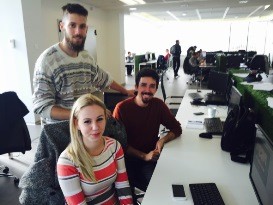
February 2016—The unemployment rate for Serbian youth currently stands at nearly 50 percent countrywide. But they are starting to chart a new course in the technology sector that may change that figure.
In October 2014, USAID partnered with DNA Communications and Orion Telekom to launch the ICT (information and communications technology) Hub to develop the entrepreneurship skills and business strategies of Serbians ages 20–35.
So far, over 60 young Serbians have participated in the ICT Hub’s intensive training module, and many more have attended monthly lectures open to the general public. The ICT Hub provides a space 24/7 where teams can collaborate, receive mentorship support from local executives, access business and legal resources, and develop programs and applications specific to the IT sector.
The ICT Hub’s bright, open, collaborative environment with young adults huddled around computers, working in teams, and concentrating on their innovative apps and IT platforms feels like a startup full of energy and promise.
“The goal is to build the potential for tech entrepreneurship while changing the mindset of young adults and the work culture within the country,” says Kosta Andrić, ICT Hub project director. “People often fear failure in this sector. Not all ideas and products may succeed, but the skills developed through the hub are transferrable to future ventures.”
During the ICT Hub’s short operation, several successful products have been developed such as Longboard Mapp, an extreme sports mobile game that has 15,000-plus users.
Vuk Nikolić, an ICT Hub participant, created TruckTrack, a management software for the trucking industry, and was connected to U.S. venture capital seed fund 500 Startups, which invested money and expertise in Nikolić’s software and team. Now, TruckTrack’s team has expanded, and the platform has over 2,000 companies registered.
Milan Brindić, 26, co-creator of Bincode Entertainment, a mobile game based on Slavic mythology, enrolled in the ICT Hub’s program after an initial investment from a Bulgarian accelerator. His team now has a space to work on the game as well as support from the hub’s extensive network of contacts. His dream is to find a game publisher and form a company.
Nemanja Stefanovic, 25, created HireApp, an application connecting youth and others with part-time jobs. He credits the creative space and mentorship offered by the hub with contributing to his success.
Other teams are just starting off the ground. Vanja Belić, 24, and his team are in the process of making a racing game. She studied IT in college, but opportunities in Serbia are limited in the gaming industry. Belić and her co-collaborators—Vladimir Perić, Stevan Janković, Vuk Splajković and others—are creating their own opportunity to break into gaming.
The next ICT Hub session of pitching to potential investors is scheduled for spring 2016. Hope lingers in the air as participants work in a flurry to innovate. In a country where jobs for youth and young adults are limited, ICT is a growing field for those entering the workforce. And the ICT Hub is a model that could be replicated in other countries to promote entrepreneurship, leadership development and economic opportunity.
LINKS
Follow @USAIDSerbia, on Facebook, on Flickr, on YouTube







Comment
Make a general inquiry or suggest an improvement.